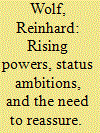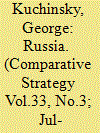|
|
|
Sort Order |
|
|
|
Items / Page
|
|
|
|
|
|
|
| Srl | Item |
| 1 |
ID:
128116


|
|
|
|
|
| Publication |
2013.
|
| Summary/Abstract |
In the ongoing struggle for influence over Central Asia, Iran has positioned itself as a regional heavy-weight, and a player with considerable strategic leverage. Tehran's influence over its neighbourhood has been growing, even as its geo-political role has witnessed a significant expansion. While Tehran has always prided itself on its political sway over its neighbourhood, it involvement in Central Asian politics had, in the past, been curtailed by Western sanctions over its nuclear program
|
|
|
|
|
|
|
|
|
|
|
|
|
|
|
|
| 2 |
ID:
098499


|
|
|
| 3 |
ID:
131997


|
|
|
|
|
| Publication |
2014.
|
| Summary/Abstract |
This article focuses on the ominous parallels between the rise of Germany before World War I and China's ongoing ascendance. It will demonstrate that concerns about national status strongly affected both the fateful escalation of the 1914 crisis and the growing antagonisms of the years preceding. Special emphasis will be given to the role that mutual 'misrecognition' played in the gradual deterioration of Anglo-German relations. The consequences of Germany's excessive fixation on status are highly relevant for contemporary China, due to the startling similarities between both countries' domestic and international settings. If China wants to avoid the policy errors that led to the Kaiserreich's self-encirclement it needs to pay more attention to dangerous feedbacks among ongoing power shifts, maritime security dilemmas and extravagant public status concerns. China should do more to ensure that external trust in its benign intentions grows faster than its international ambitions and military power. This requires, among other things, an early settlement of ongoing territorial disputes, a toning down of jingoistic domestic discourses, enhanced leeway for speakers advocating international cooperation, and higher investment in multilateral institutions. Beijing's partners, for their part, must encourage such self-binding policies by facilitating China's rise in status, specifically by giving Beijing a greater say in these institutions
|
|
|
|
|
|
|
|
|
|
|
|
|
|
|
|
| 4 |
ID:
133994


|
|
|
|
|
| Publication |
2014.
|
| Summary/Abstract |
Russia's current system of government is weakening. Putin's annexation of Crimea only masks this underlying trend. The system remains centered around Putin. Putin has effectively eliminated individual and institutional political rivals. But public criticism has become more diffuse and hard to neutralize. The impact of public opinion on driving the political process is growing and the opposition is expanding and coalescing. This is manifested through multifaceted forms of dissent and the growing influence of opposition leader Aleksey Navalniy. The dissent, which was initially fueled by prominent opinion makers, evolved into sporadic protests in key urban centers and political campaigns. Why did people who used to support Putin or were apathetic become critical to the point of speaking out and even engaging in opposition activity? The most likely catalyst was the 2008-2009 financial crisis. It undermined Putin's longstanding argument that an authoritarian system, with him at the helm, was necessary for economic advancement. Beyond economics alone, resentment is driven more generally by state incapacity-incapacity to strengthen the social safety net, improve public services, and effectively address corruption; violent crime; natural disasters; and terrorism-which increasingly contrasts Putin's stability narrative. Credible estimates and public perceptions indicate that corruption levels today exceed even those of the turbulent 1990's. Russia's leadership is known to be the key driver and beneficiary of this trend, which is also an important component that fuels discontent. The opposition has not organized into a political party and the government temporarily bolstered its popularity through outside intervention. This makes it hard for the opposition to dislodge Putin and for Putin to contain the opposition, which is creating an impasse. Russia is likely to be increasingly characterized by volatility-internally and on the international stage. This volatility positions the U.S. and the European Union to have greater influence on Russia but it's important for the West to understand how to take advantage of its already substantial leverage.
|
|
|
|
|
|
|
|
|
|
|
|
|
|
|
|
| 5 |
ID:
119528


|
|
|
| 6 |
ID:
133627


|
|
|
|
|
| Publication |
2014.
|
| Summary/Abstract |
The final session of Yemen's National Dialogue Committee concluded on January 25, 2014, with an agreement on a basic constitutional document describing a unified but federated and democratic Yemen. To be sure, there are issues still to be worked out: the number of states to be federated - with some southerners still holding out for two (north and south) and others insisting on four or six - and an arrangement with the Houthi tribe in the north defining their state and the parameters of their local government. U.S. diplomacy has not, to date, contributed to the resolution of these two nagging problems. There will, however, be ample opportunity to help ease the tensions of regionalism with track-two-type ideas and projects to help establish trust among the conflicting regions. Keeping Yemen together is in the U.S. national interest, and spending economic and political resources towards that end is therefore worthwhile.
|
|
|
|
|
|
|
|
|
|
|
|
|
|
|
|
|
|
|
|
|